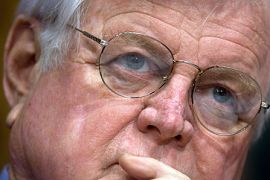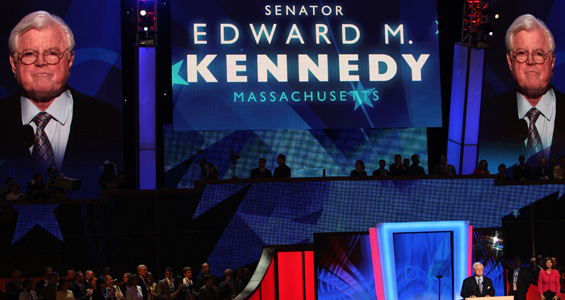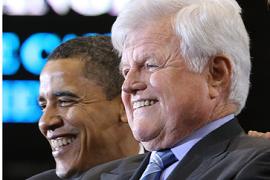Obituary: Edward M. Kennedy
US politician was one of most influential and longest-serving senators in US history.

 |
|
Kennedy spoke at the Democratic National Convention in 2008 in support of Obama [Gallo/Getty] |
Edward Moore Kennedy, a senior US senator from the northeastern state of Massachusetts and member of one of the most politically renowned families in America, has died at the age of 77.
One of the longest-serving senators in US history, Kennedy was a liberal political figure who was also considered an effective congressional dealbroker.
Keep reading
list of 4 items‘Mama we’re dying’: Only able to hear her kids in Gaza in their final days
Europe pledges to boost aid to Sudan on unwelcome war anniversary
Birth, death, escape: Three women’s struggle through Sudan’s war
Known as Ted, he was the brother of John F. Kennedy, the former US president who was assassinated in 1963, and Robert F. Kennedy, a former US senator who was fatally shot while campaigning for the 1968 Democratic presidential nomination.
Born on February 22, 1932 to a prominent Irish-American family, Kennedy entered public office in November 1962 when he was elected to fill the senate seat previously held by his brother John.
Effective senator
Initially viewed as a political novice who owed his prominence to his family connections, Kennedy soon became known as one of the most effective senators in Washington.
He played a major role in passing several pieces of law, including measures to protect civil and labour rights, increase student aid and improve schools, as he became the third-longest serving senator in history.
|
“I think most of all it’s the injustice that I continue to see and the opportunity to have some impact on it” Edward Kennedy, late US senator |
But he is perhaps best known for his work in pushing for universal healthcare coverage across the US.
“There’s a lot to do,” Kennedy told the Reuters news agency in 2006 as he attempted to put a finger on what motivated him.
“I think most of all it’s the injustice that I continue to see and the opportunity to have some impact on it.”
As the sole remaining Kennedy brother, he was left to pick up people’s hopes for the dynasty.
Delivering the eulogy at the funeral of his brother, John, in 1968 he spoke of a better future and the values he would later work towards.
“My brother need not be idealised, or enlarged in death beyond what he was in life; to be remembered simply as a good and decent man, who saw wrong and tried to right it, saw suffering and tried to heal it, saw war and tried to stop it,” he said.
Image tarnished
However, Kennedy’s public image took a major hit after a 1969 incident in which a young woman drowned after the car he was driving plunged off a bridge in Massachusetts.
It emerged that he had failed to report the accident to authorities and received a suspended jail sentence after pleading guilty to leaving the scene.
 |
| Kennedy endorsed then-presidential candidate Barack Obama in the 2008 election [AFP] |
After the incident – which became known as Chappaquiddick – Kennedy gained a reputation as a heavydrinker and a womaniser, a tragically flawed figure who did not quite measure up to his brothers.
However, his standing eventually recovered to such a level that he was able to challlenge for the Democratic party presidential nomination.
“He ran for the presidency in 1980, but lost to the incumbent, Jimmy Carter,” Rob Reynolds, Al Jazeera’s senior Washington correspondent, said.
“But he gave a speech that everyone who was there at the time will remember in which he said, ‘The work goes on, the cause endures, and the dream will never die’.”
Jack Burkman, a Republican party strategist, told Al Jazeera that the speech was Kennedy’s “shining moment”.
“It is one of the great speeches in American political history, perhaps one of the greatest speeches in the modern political history of the world.
“I say that not agreeing with its content,” Burkman said.
Backing Obama
In his later years, Kennedy came to be regarded as an elder statesman on Capitol Hill, seen as one of the most effective, hardworking legislators in Washington.
He was considered as one of the few senators who could truly reach across the aisle and bring Democrats and Republicans togther.
In 2008, Kennedy collapsed at his home from a seizure and was later diagnosed with brain cancer after which he underwent surgery in June.
But he recovered sufficiently to make dramatic appearance at the Democratic National Convention in Denver in 2008 in support of then Democratic presidential candidate Barack Obama.
But his illness kept him from attending the funeral of one of his sisters, Eunice Kennedy Shriver, who died at the age of 88 earlier this month.